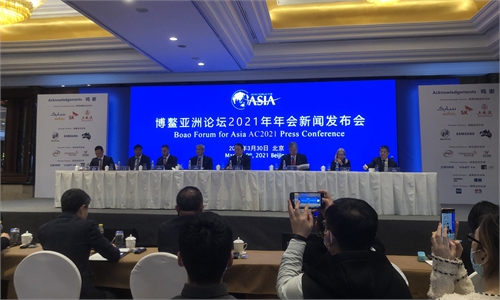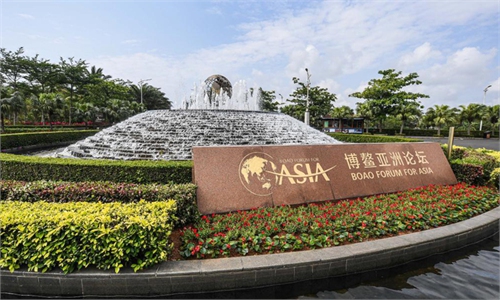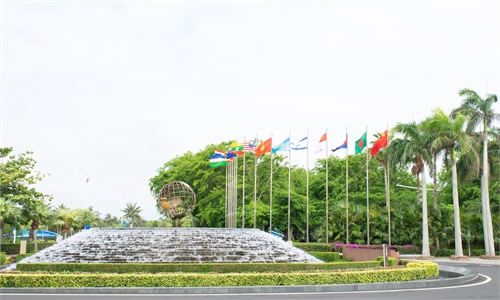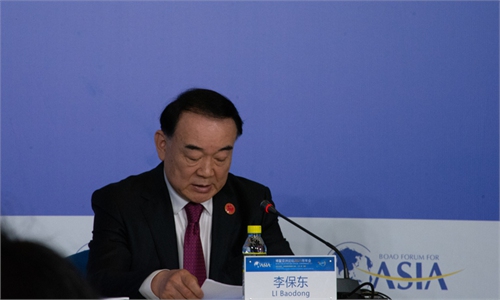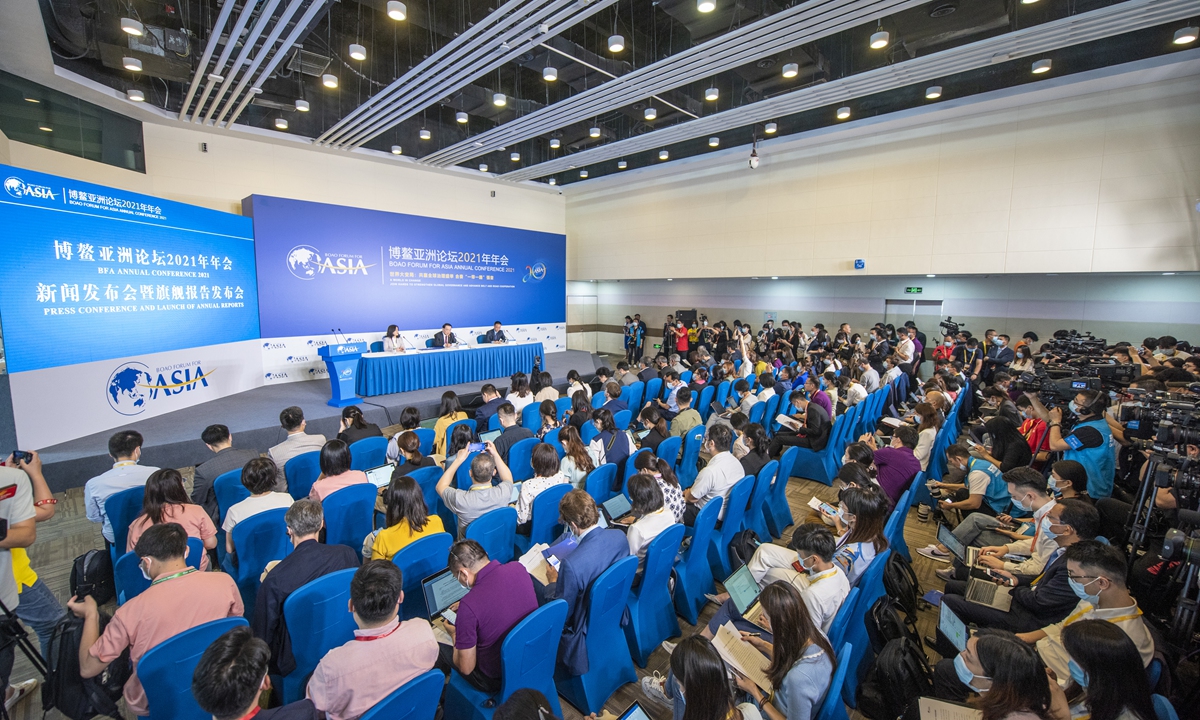
The 2021 Boao Forum for Asia (BFA) kicked off in Boao, a coastal resort in South China's Hainan Province on Sunday. In the post-COVID19 era, attendees' anticipation for the conference, also the first international forum comprising mostly offline conferences this year, includes not only helping Asian countries shore up confidence in accelerating economic growth, but also taking it as an international exchange forum that has a global impact.
The four-day annual conference, which is themed around "A World in Change: Join Hands to Strengthen Global Governance and Advance Belt and Road Initiative (BRI) Cooperation," is scheduled to be held from Sunday to Wednesday this week.
On-site pandemic control was strict and thorough during the BFA. A security person, sitting next to a temperature checking robot at the entrance of the conference halls of the BFA, told the Global Times on Sunday that whoever has a body temperature over 37 C will not be allowed to enter the conference area and will be directly taken away for nucleic acid testing and go through medical treatment or observation.
Temperature screening, masks and alcohol disinfection products are seen at entrance of every major venue hall. Dining sites were also separated by glass for epidemic control.
"Despite the pandemic, a total of approximately 2,600 representatives from more than 60 countries and regions, and more than 1,200 journalists from 160 media organizations from 18 countries and regions attended the conference, BFA Secretary General Li Baodong, told a press conference on Sunday.
"In total, more than 4,000 participants have registered offline for the event, an unprecedented scale, and is the world's largest offline conference so far this year," said Li.
Moreover, 40 dignitaries and former dignitaries, 74 ministerial and former officials, dozens of heads and senior leaders of international organizations, dozens of envoys in China, representatives of international organizations, and nearly a hundred executives from world-renowned companies, will also attend the meeting via online or offline channels, Li said.
Topics including carbon neutrality, climate change, and digital economy will top the agenda in the following days. An official opening ceremony will be held on Tuesday.
"The fact that we are sitting face-to-face and in crowded places, and yet we know we are safe is an indication that the pandemic can be prevented and managed, which shows strong political will," Siddharth Chatterjee, the United Nations Resident Coordinator in China, said in a group interview on Sunday, adding that it also shows the discipline, resilience and how science has prevailed in China.
"I hope the rest of the world embraces the same method and then we would be able to overcome the pandemic much faster," he noted.
Increasing Asian role
The BFA has released an annual report on the Asian economy on Sunday, saying that under the impact of the coronavirus pandemic, Asian economies have experienced a sharp drop in growth rates, however, Asian economic performance as a whole has been significantly better than the rest of the world.
In terms of purchasing power parity, Asia's share in the global economic aggregate in 2020 reached 47.3 percent, up 0.9 percentage points from 2019, the report showed, indicating the increasing role of Asia in the global economy. As Asia's largest economy, China led Asia with an impressive GDP growth rate of 2.3 percent last year.
In the first quarter of 2021, China's economy grew by 18.3 percent year-on-year.
The report also shows that the economic integration of all Asian economies is accelerating. By February 2021, there had been 186 regional trade agreements in force inside and outside Asia, accounting for 54.9 percent of the total regional agreements around the world.
In particular, the signing of the Regional Comprehensive Economic Partnership Agreement (RCEP) in November 2020 has been injecting strong momentum into regional and global economic growth, which is expected to give renewed impetus to further accelerate the negotiation of free trade agreements in Asia.
The integration of the trade of goods and services in Asia is accelerating. The trade dependence of Asian economies among each other is nearly 50 percent in 2019, with bilateral trade volumes continuing to grow, said Lin Guijun, vice president of the University of International Business and Economics, during a press conference at Boao on Sunday.
Looking ahead to 2021, the Asian economy will likely experience consistent growth, with a growth rate of more than 6.5 percent, the report noted, citing the pandemic as the main variable that affects regional economic growth.
"At present, pandemic prevention and control and the subsequent economic recovery still face great uncertainties, and it is urgent that all countries around the world work together to overcome the difficulties stemming from it," Hu Qimu, chief researcher at the Sinosteel Economic Research Institute, told the Global Times on Sunday.
However, the recent actions from the US, for example, show that unilateralism still attempts to dominate global governance. The convening of the Boao Forum, a multilateral forum, at this juncture is of great significance to pandemic prevention and control, economic recovery and the easing of regional tensions, Hu said.
Higher expectations
Participants of the forum are also expecting to seek experiences, discuss latest issues from climate change to pandemic control, and find opportunities in the world's second-largest economy, also the only major economy in the world that has achieved positive economic growth for 2020.
"Since its launch 20 years ago, the Boao Forum for Asia has provided a high-end platform for political, business and academic leaders in Asia and the world. It has made positive contributions to the promotion of regional economic integration, common development and the building of a more prosperous and harmonious Asia," Thomas Leung, Managing Partner of Markets at PwC China, told the Global Times.
COVID-19 has had a major impact on the global economy and community over the past year. We hope to discuss this and other significant issues with the parties present at this year's meeting, Leung said.
Sylvain Laurent, Executive Vice President of Dassault Systèmes, a French software corporation, said the Boao Forum has become an important bridge connecting China and the world, and an international exchange platform with global influence." Through this year's BFA, we expect to have a deeper understanding of the needs of enterprises in China and Asia during the intelligent transformation period," he told the Global Times in an interview on Sunday.
Erik Solheim, Convener of the BRI International Green Development Coalition Advisory Committee and former Executive Director of the UN Environment Program (UNEP), said he hopes China will introduce more of its experience regarding environmental technology to the world during the BFA.
"China is the number one provider of environmental technology in the world. More than half of all solar energy comes from China. China is number one on electric vehicles, on building hydrogen energy. Therefore, China should use the Boao Forum to expose all these practices and ideas to the world," Solheim said.

